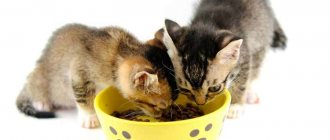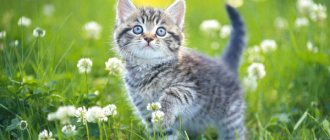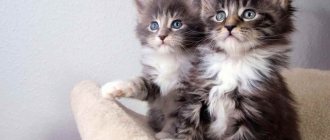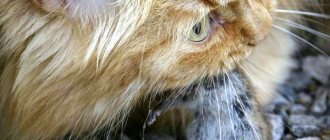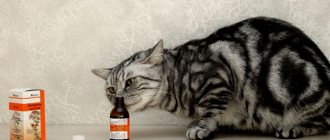As you know, cats are very curious animals. This is especially true for those animals who have developed a wonderful relationship with the owner - if the cat considers you a true friend, then it will certainly show interest in everything you do. And, of course, sniff everything you deal with, be it food or some things.
However, it is important to understand that cats' sense of smell is much more sensitive than that of humans. Therefore, you should know which smells cats are partial to, and which ones seem disgusting to them - in order to avoid incidents.
Catnip
Nepeta cataria, better known as catnip, has a powerful narcotic effect . In animals, the active ingredient found in the plant, nepetalactone, has a psychoactive effect on cats, which encourages them to stimulate the mind and make them play and move. Thus, when a cat smells the odor that catnip gives off, it tends to rub it, lick it, eat it, and exhibit unusual behavior such as jumping and even hunting non-existent animals.
Because it stimulates the animal's mind and keeps them active, catnip is one of the most beneficial for them, and it is also the scent that attracts cats. More information in our article on the properties of catnip.
Store products
To treat upholstered furniture where the presence of a cat is not desirable, use citrus-scented detergents. They can be used to treat shoes, clothes or floors marked by a cat. This will not only eliminate the unpleasant odor, but also prevent such cases.
Strong irritation in cats is caused by sharp, rich odors of perfumes. Use your favorite scent or eau de toilette. Nail polishes and various solvents have the same effect. Although you may think that the scent fades quickly, your pets will notice it keenly. Later, cats develop a reflex to forbidden places.
The smell of strong alcoholic drinks, such as vodka or cognac, disgusts your pets. They also don't like cigarette smoke. Cats cannot tolerate these aromas on a physiological level.
Also, furry domestic predators are wary of various medications, with the exception of valerian.
Olive
Considered as another scent that cats love, olive tree also has a narcotic effect that changes the cat's behavior. This is because one of the most active components in the leaves and trunk of the olive tree is a substance called oleuropein . Just like catnip, when a cat smells this scent, they tend to rub, lick, eat their leaves and exhibit a more active attitude, behavior similar to the behavior they have when mating.
Some cats have this attraction just because of the leaves, while others are attracted to all parts of the olive tree, from the olives to the olive oil. Likewise, this scent has not yet been scientifically proven to have a relaxing effect on cats, so we cannot say that this fact is real, but it certainly affects their central nervous system and makes them more active and playful...
So, what will a cat definitely want to sniff?
♦ Unfamiliar objects.
Firstly, the cat will definitely want to sniff any new object that has appeared in your house. Whether you came from the store with a bag of groceries, bought yourself a new jacket, or simply took out a box from the closet that had been collecting dust there for years, the cat will definitely show interest in every item, and therefore will sniff absolutely everything.
It’s just that smell is an important way to obtain information about an object - therefore, with the help of sniffing, the cat “gets acquainted” with it.
♦ The smell of food.
Of course, everyone loves to eat delicious food! Therefore, when you prepare your own food, the cat will certainly show interest in it. Remember – you can’t fool a cat! If you cook meat, you shouldn’t really count on the fact that your pet will sleep carefree with its belly up. He will definitely wake up to the smell of meat! After which he will present you with the corresponding claims.
Just like people, cats have their own taste preferences. Therefore, sometimes they react to odors that theoretically should not interest cats - for example, the smell of mushrooms. What kind of food specifically attracts your cat - you will quickly understand this. It is important that while cooking or dining, you do not forget to treat your friend - and not necessarily with the food that is due to you. Otherwise, they may be very offended at you.
♦ Green plants.
There are probably no cats who would be completely indifferent to the smell of fresh grass and indoor flowers. Why plants are so attractive to pets is a controversial question. Firstly, cats in the wild often chew grass to normalize digestion, and the same impulses arise in domestic cats. Or maybe, besides this, they just like “lively” and fresh smells.
Be that as it may, you should know that your cat can easily nibble on your indoor flowers or even eat them. Therefore, protect your plants from your furry prankster, while not ignoring his needs. Don't forget to periodically bring your cat some plain grass from outside so she can eat it. Just don’t pick up grass near roads, where a lot of dust settles and other nasty things can end up - choose grass in clean places. And don’t worry about the cat - she will figure out on her own whether this particular herb is edible for her or not.
♦ The smell of your own toilet.
When it comes to toileting, cats are not as squeamish as people. Therefore, they can not only sniff their litter box, but also show great interest in those places that were previously used by the cat as a toilet. Accordingly, if your pet has “committed a crime” somewhere, then you should take care to get rid of the smell for sure. And this issue needs to be approached very responsibly - even if it seems to you that there is no smell here anymore, the cat may not think so. And if her sensitive sense of smell reminds her of what this place was used for, then she will be able to repeat such an act.
♦ Valerian.
Probably everyone has heard about the extraordinary craving of cats for valerian. Entire stories are already being written about this fact and anecdotes are being told, which are well founded. Indeed, if you have valerian tincture stored at home, it will not escape your pet’s attention. The first time you open a bottle, your cat will get wind of it—and he will “get it” in the literal sense. Know that your pet does not need a large dose.
Having felt the alluring smell, the cat will immediately become intoxicated - he will get into an excited state, start rolling on the floor, playing with his tail and doing other stupid things. And, of course, he will try to take the treasured bottle from you. But it’s probably not worth giving the bottle to the cat. Valerian itself is harmless, and the intoxication from it passes quickly. However, there is no point in overusing anything, especially since valerian tincture is made with alcohol - it’s hardly worth giving this to your cat, right?
♦ Cat mint.
In addition to valerian, there is another herb whose smell has an intoxicating effect on cats. This is probably why this plant got its name - catnip. The smell of this plant attracts cats no less than the smell of valerian, and its effect is similar to the above-mentioned plant. Catnip is sold in dried form in pet stores and some supermarkets, it is intended for stuffing cat toys and impregnating scratching posts. The smell of this plant is not harmful to the cat, but it should not be chewed - it is not intended for consumption by cats.
Honeysuckle
Honeysuckle is part of the popular bach flowers and as such they work on a cat's body to have a powerful calming and calming effect. Thus, we can say that the aroma of this plant is one of the odors that relax cats . So much so that these plants are now used in cats and other animals for therapeutic purposes such as treating insomnia, stress or anxiety...
Like the previous plants, honeysuckle's composition attracts cats and makes them want to rub, lick and eat. But be careful! Honeysuckle berries are toxic to cats, so it is important to stop them from eating the plant and simply smell it and enjoy its aroma.
comments
Moira My minke whales do not like the smell of Corvalol, unfortunately it disappears quickly. The smell of citrus fruits does not bother them at all, and they simply adore the smell of bleach - if you wash the floor with water with the addition of a small amount of Domestos, they begin to roll right on the wet floor. Moira By the way, the kitten simply pushes away anything that he doesn’t like, the way it smells, for example, orange peels.
Irina I had a cat (Don Sphynx), which was absolutely indifferent to valerian, but was crazy about the whiteness and loved to rub against surfaces treated with it
Denis Cats love the smell of chlorine, not so much citrus fruits, the article is about nothing.
I My cat loves oranges.
Olga Hello everyone, my kitten doesn’t mind any smells, be it citrus fruits, vinegar, etc. I just can’t stop him from doing his business in the hallway.
Svetlana Our cat is sick of the smell of bleach.
Lavender
Just like us humans, the scent of lavender attracts cats, drawing them in to smell and rub against it. However, its attraction power is not as strong as the previous plant, and therefore some cats may not show the same interest and may even reject the plant...
If your furry companion is one of those cats that loves this scent, you can use it to encourage a state of relaxation . Especially in cases of anxiety and mild aggression, the use of this natural therapy, along with other relaxing factors and finding the cause of the problem, has been shown to help the animal feel much calmer.
Cats don't like essential oils. Because your sense of smell is so strong, any essential oil can be too overpowering. When used in a diffuser or very diluted, it can mimic the pleasant scent of fresh lavender.
Why does the cat shit?
It happens that a cat, trained to use a litter box since childhood, suddenly suddenly changes its behavior: it marks and defecates anywhere, but not in the litter box. This causes many problems for the owners. Firstly, a sharp and unpleasant smell of cat feces appears at home, which is difficult to remove. Secondly, driving a cat away from its “habitual” place is also difficult. Favorite places for furry robbers to relieve themselves “by the tray” are:
- corners;
- the space between the wall and the door;
- the floor under the curtain in the room;
- floor under the bathroom;
- shoes of the owner or his guests;
- carpet;
- flower pots;
- master bed.
There may be several reasons for a cat’s outrageous behavior:
- revenge. If an animal is treated roughly and neglectfully, it may begin to shit. If there is a cat in the house, it must be treated with respect;
- partying. A cat may mark or defecate anywhere because they want to attract the opposite sex with their scent;
- lack of education. The kitten needs to be trained to use the litter box from childhood. If this moment is missed, serious problems may arise in the future. Similar incidents arise when an animal is taken home from the street. It can be difficult to train an outdoor cat to use a litter box, but it is possible - and this should be done immediately after he arrives in your home;
- animals “don’t like” the smell of toilet fillers or their composition;
- the owner bought a cat litter box of the wrong shape (for example, the container may be too small, but the cat may be too large and vice versa);
- The cat suffers from diseases of the kidneys and other genitourinary organs.
Important!
If the owner is lazy and does not clean the cat litter box on time, this can become another reason for the saturation of the house with “cat scents.”
Thyme
Thyme is not only part of the smells that attract cats, but it is also one of the healthiest for them. Thanks to its soothing and anti-inflammatory properties, when prepared as an infusion or tea, it helps treat irritated and inflamed eyes in cats, thus relieving symptoms caused by, for example, conjunctivitis or certain allergies.
On the other hand, its aroma acts as a natural relaxant and hence promotes calmness in the cat. To do this, it is best to use thyme essential oil or buy this aromatic plant. However, as with lavender, thyme may not be as effective as not all cats are attracted to its scent.
"Smart" repellent sprays
Special purpose sprays perform two tasks at once. The first is protecting pieces of furniture from the cat’s teeth and claws, and the second is scaring the animal away from areas where it commits its indecencies. Sprays should only be used indoors. If a cat gets into the habit of pooping in the garden or greenhouse, there is no point in using such a product, because the smell quickly disappears.
Information!
Unlike other methods, sprays are more effective at combating urine and mark odors.
The peculiarity of such sprays is that they are very bitter. As soon as the cat finds itself in the place where the product is sprayed, it begins to have an allergic reaction in the form of drooling. There is no need to worry about this: as soon as the animal leaves the “place of chemical damage”, the reaction will immediately stop. After such a state, the robber will develop a persistent conditioned reflex of a negative nature. The cat will avoid “favorite” areas. Since there will be no smell of urine in the area, there is a chance that the outrage will soon stop.
Cat owners and veterinarians have differing opinions on smart sprays. The effect of such a remedy cannot last forever - due to differences in the olfactory systems of different cats. In any case, it’s worth a try, and if you manage to achieve results, you can forget for a long time about the unpleasant smell and the stubborn attempts of the tailed bandit.
There are several sprays that are always available in pet stores. They all have similar specific actions.
NM JFC Pet Block Cat Repellent Spray
The spray has a prolonged action. Its main function is to help the owner ensure that the cat only goes to the litter box. Thanks to the use of this product, the animal is accustomed to the tray in a short time. With this spray you can save furniture, wallpaper and walls from sharp cat claws. It poses no danger to either people or cats.
Beafar STOP IT CAT
The composition of the mixture smells like acetone. This is exactly what fragrant rue smells like - the first “enemy” and cat repeller. Treatment is carried out once a day - until the animal stops crawling to its usual places.
Mr. Fresh
The best spray that protects furniture and other objects from cat claws. With its regular use, you can quickly accustom your animal to the scratching post. Mr. Fresh contains alcohol, the bitterness of wormwood and a tart flavor. Like other products, it does not pose a danger to people and all animals in the house.
"True friend 4 in 1"
An effective dual-action spray will help stop your cat from scratching and marking furniture. The product comes with detailed instructions for its use, which should always be followed. The main thing is to patiently treat areas that smell of urine until the smell is eliminated and the animal stops regularly visiting these areas.
"Stop Problem"
Weans not only cats, but also dogs from indecent behavior. Surfaces are treated until odors disappear completely, observing the behavior of animals. As soon as the cat or dog begins to avoid the treated areas, consider that the “operation” has been a success.
If your pet shits, don’t despair. First, prepare a simple home remedy, and if it does not help, buy any of the suggested sprays. Try combining methods with each other and you will definitely achieve success.
Subscribe to our channel in Yandex.Zen! Click “Subscribe to channel” to read Hozsekretiki.ru in the Yandex feed
Floral scents
Many cats feel trapped by the intense scent of certain flowers, such as roses, daisies and lilies. But if this is the case with your cat, you should know that some of them are very toxic if ingested, like the last two mentioned. Thus, it is better to keep cats away from the real plant to avoid possible poisoning...
How to use
First, do a little experiment to find out which smell your cat particularly dislikes. If your pet reacts to citrus fruits, place their peels in prohibited places. As the crusts dry out, replace them with fresh ones. To stop your pet from going to the toilet in the wrong place, first clean this area well with detergent, then treat it with orange or lemon juice. You need to do such procedures until the cat gets used to avoiding the forbidden place.
It is very effective to protect indoor plants with onions and garlic. To do this, finely chop or press the vegetables, place them on a small saucer and place them on the windowsill near the plant the cat likes.
To wean a cat from visiting a certain place, you usually have to treat it with a strong-smelling product several times.
You can prepare a special tincture for treating upholstered furniture. Chop the onion and fill it with water. Leave the mixture for 2-3 hours, then strain. First test the product on an inconspicuous area of fabric. If no white spots remain, feel free to use this tincture. Wipe the upholstery with the resulting liquid. You can use a spray bottle - keep it at a distance of 20–30 cm.
However, sometimes it is not enough to simply treat the furniture with a repellent. Since the cat needs to sharpen its claws, you should purchase a special scratching post. To accustom your pet to it, wipe it with mint or valerian - these smells are very attractive to the animal.
If your cat is used to jumping on the kitchen table in search of something tasty, you can wean him off with the help of spices or alcoholic beverages. Leave a glass of vodka or cognac overnight. You can make a fragrance with the addition of essential oils. Place a container of black pepper, ginger or cinnamon on the table. For greater effect, treat the legs of kitchen furniture with citrus juice.
Using home or store-bought products, you can protect your furniture, indoor plants and clothing from attacks by your pet. Over time, repellent odors will develop a reflex in the cat, and in the future he will avoid forbidden places. When using various products, do not exceed the permissible dosage. This can cause allergies in household members.
Popular publications
latest comments
Pleasant and unpleasant smells for cats
Scents that are exotic and exciting to cats can be terrifying to us.
Cats love food that smells good to them, and the pet food industry thrives on this craving. The liquid, prepared after fermenting fish scraps, poultry organs, beef liver and lungs, is often sprinkled onto dry cat food during the cooking process to increase its appeal to cats.
Another example of how cats react to smell. Sometimes a cat will refuse to use her litter box if it has just been cleaned or replaced with a new one and has an odor that may be attractive to the owner, but not to her. Sometimes a cat may refuse to approach a loved one's outstretched hand if that hand has recently touched mothballs during spring cleaning. In a nicer example, sick cats can often be enticed to eat if their food is slightly warmed to enhance the smell.
Fruit aromas
Fruits such as strawberries, peaches or watermelon emit very distinctive and intense aromas that quickly attract cats' attention. In this sense , it is true that scents can certainly attract cats and entice them to try food. Many of them even have multiple benefits for your body, such as antioxidant, cleansing and diuretic properties, as well as fiber and lots of vitamins. However, not all fruits are attractive to these animals, since citrus fruits emit a really unpleasant aroma for them...
If you notice that your cat is attracted to the smell of certain fruits, don't miss our article listing the most recommended fruits for cats and start offering them as rewards...
Home Remedies
Citrus fruits, especially lemon, tangerine and orange, effectively repel furry pets. You can use both the peel and juice of the fruit.
Cats really don't like the strong smell of vinegar. Just one drop of acid is enough to protect indoor plants or a closet with clothes. The aroma quickly dissipates, and over time a person ceases to feel it. However, cats will avoid the area treated with vinegar for a very long time.
But the smell of onions, garlic and ginger causes a feeling of disgust in cats. To enhance their effect, vegetables need to be peeled and finely chopped. Pets are also afraid of any spices. The most intolerable spices are cinnamon, cayenne or ground black pepper.
When you inhale the scents of lemongrass and rosemary essential oils, your pet will feel anxious and dangerous. Lavender and fragrant rue also produce a similar effect. You can use fresh twigs, leaves or oil from the plant.
What is your cat's favorite smell???
After reviewing the list of smells that cats like best, tell us what your cat likes best! We are sure that he has discovered that there is some plant, food or object that has an attractive effect on his furry friend, and every time they identify it, they quickly run towards it with enthusiasm...
Likewise, as we already pointed out in the article, not all smells are welcome for all cats, since each animal represents a world and has its own tastes .
Thus, a cat may love the smell of thyme but reject lavender completely. Because of this, we recommend that you refer to the publication to explain 10 smells that cats hate.
A shitting cat and its owner's strategy
Spanking animals, pulling their collars, shouting at them “so they don’t spoil things” is useless. In a fit of anger, the owner can harm the pet, so you should not use physical force. You can scold the fluffy and lightly poke his nose into the puddle, but you won’t be able to do without additional measures.
You can scare away a cat and stop it from misbehaving in more humane ways. There are several odors that cats cannot tolerate, and this fact can be successfully used. They use both regular and special means that will help cope with the “cat scourge” without harming the health of your furry friend.
You need to take into account what smell your pet likes and buy a litter with his favorite flavor. This will attract the animal to the tray and distract it from its favorite “bad places”. If folk remedies do not help, buy a “smart” aerosol or spray, after consulting with your veterinarian. Pay attention to products with an automatic sprayer. They are equipped with motion sensors that repel cats.
